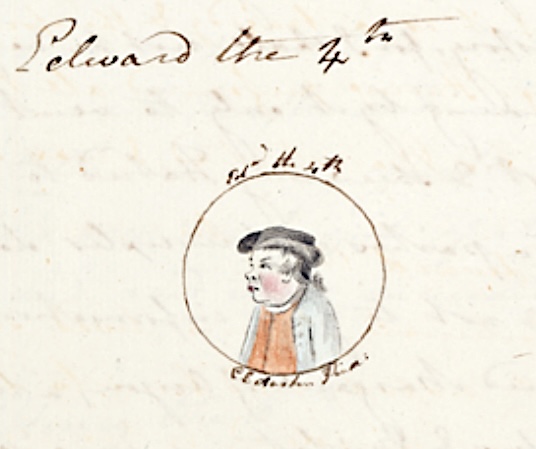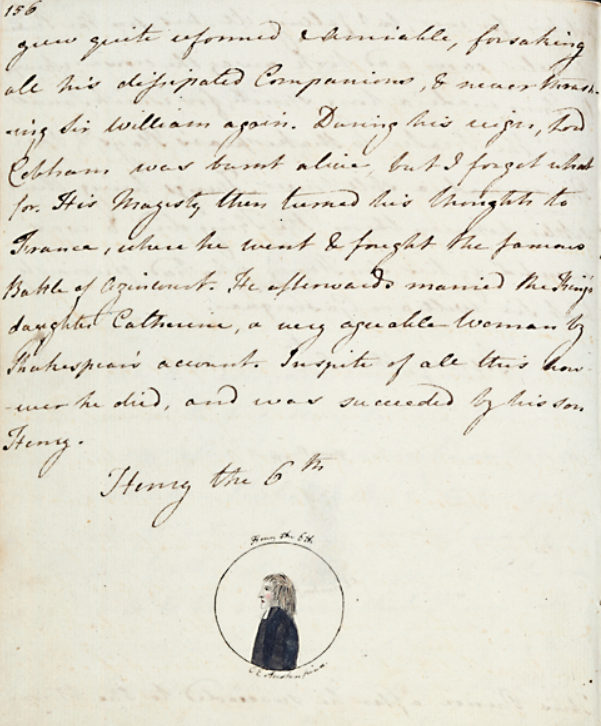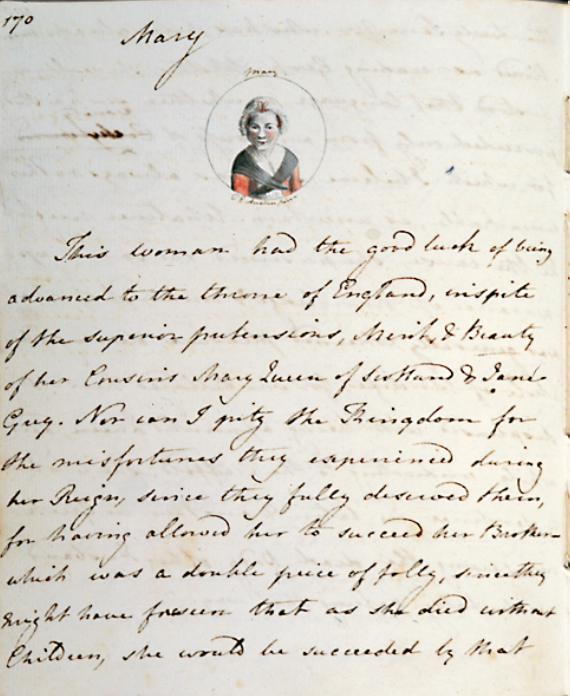
Last week, we posted about the British Library’s colossal online exhibit, which includes over 30,000 items, all freely digitized for reader perusal. Although we’d mentioned some of the choicest holdings — the original writings by Mozart and da Vinci, for example — we’ve recently come across another piece of literary history that compelled us to revisit the collection: a browsable manuscript of Jane Austen’s The History of England, penned in 1791, when the author was only 15 years old.
Austen was, by and large, a homeschooled and autodidactic child. Although she had taken part in some formal schooling between the ages of 7 and 10, illness and the family’s lack of means dictated that she had to rely on her father’s extensive library for an education. By the time she was fifteen, Austen had evidently gathered sufficient material to fuel her writing, and had completed a history of England, beginning with Henry IV (1367–1413), and ending with Charles I (1600–1649). Above, you can see one of the book’s many illustrations drawn by Jane’s elder sister, Cassandra, depicting Edward IV, of whom Austen writes, “This Monarch was famous only for his Beauty & his Courage, of which the Picture we have here given of him, & his undaunted Behaviour in marrying one Woman while he was engaged to another, are sufficient proofs.” In spite of its brevity — the book numbers only 36 handwritten pages — Austen’s juvenilia shows unmistakable signs of her distinct satirical voice. The volume is, in fact, a parody of the stuffy claims of objectivity found in 18th century grade school history textbooks, like Oliver Goldsmith’s The History of England from the Earliest Times to the Death of George II. Rather than follow suit, Austen skips trivialities such as key dates and events, noting to her readers in the introduction to a section on Henry VIII,
“It would be an affront to my Readers were I to suppose that they were not as well acquainted with the particulars of the King’s reign as I am myself. It will therefore be saving them the task of reading again what they have read before, & myself the trouble of writing what I do not perfectly recollect, by giving only a slight sketch of the principal Events which marked his reign”
I had the sense that Austin relished writing such humorous prose as much as I enjoyed reading it. Unconstrained by the formalities of her medium, she takes to referencing Shakespeare and giving voice to her numerous opinions. Take, for example, her entries on Henry V and Henry VI:
Henry the 5th
This Prince after he succeeded to the throne grew quite reformed and amiable, forsaking all his dissipated Companions, & never thrashing Sir William again. During his reign, Lord Cobham was burnt alive, but I forget what for. His Majesty then turned his thoughts to France, where he went & fought the famous Battle of Agincourt. He afterwards married the King’s daughter Catherine, a very agreeable Woman by Shakespear’s account. Inspite of all this however, he died, and was succeeded by his son Henry.
Henry the 6th
I cannot say much for this Monarch’s sense. Nor would I if I could, for he was a Lancastrian. I suppose you know all about the Wars between him & the Duke of York who was of the right side; if you do not, you had better read some other History, for I shall not be very diffuse in this, meaning by it only to vent my Spleen against, & shew my Hatred to all those people whose parties or principles do not suit with mine, & not to give information. This King married Margaret of Anjou, a Woman whose distresses & misfortunes were so great as almost to make me who hate her, pity her. It was in this reign that Joan of Arc lived & made such a row among the English. They should not have burnt her — but they did.
The whole book, including the above pages on Queens Mary and Elizabeth, may be viewed at the British library’s website.
Ilia Blinderman is a Montreal-based culture and science writer. Follow him at @iliablinderman, or read more of his writing at the Huffington Post.
Related Content:
New Stamp Collection Celebrates Six Novels by Jane Austen
Read Jane Austen’s Manuscripts Online
The Recipes of Iconic Authors: Jane Austen, Sylvia Plath, Roald Dahl, the Marquis de Sade & More
Find Jane Austen’s Works in Our Free Audio Books and Free eBooks Collections




Thank you for bringing this wonderful bit of literary history to the world attention. In the future, however, out of respect for the writers whose prose you admire, please refrain from abusing the English language by using the word, “reference,” as a verb. Miss Austen would cringe.
Fantastic and a joy to read
and @Frank Schmidt: Reference is a verb (http://dictionary.reference.com/browse/reference)
I am surprised that you left out the most interesting part of the FIFTEEN year old Jane Austen’s History of England, this passage about James I:
His Majesty was of that amiable disposition which inclines to Freindship, & in such points was possessed of a keener penetration in Discovering Merit than many other people. I once heard an exellent Sharade on a Carpet, of which the subject I am now on reminds me, and as I think it may afford my Readers some Amusement to find it out, I shall now take the liberty of presenting it to them.
Sharade My first is what my second was to King James the 1st, and you tread on my whole.
The principal favourites of his Magesty were Car, who was afterwards created Earl of Somerset and whose name perhaps may have some share in the above-mentioned Sharade , & George Villiers afterwards Duke of Bucking ham.
For why I believe Jane Austen was pointing to Fanny Hill, read this:
http://sharpelvessociety.blogspot.com/2013/02/jane-austens-carpet-sharade-on-james.html
Cheers, ARNIE PERLSTEIN
@JaneAustenCode on Twitter